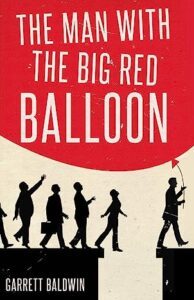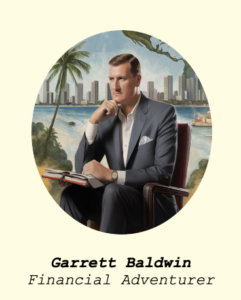Postcards from the florida republic: An independent and profitable state of mind
Now that July 4 is in the rearview mirror, it's time to talk about the economic trend making us less free by the day.
My eyes cross when I hear pseudointellectuals on MSNBC and CNN claim America's problems are the results of free-market capitalism.
I laugh in their faces because their claims are laughable – they imply the United States is an economically free nation.
Consider the Heritage Foundation's Economic Freedom Index, where the U.S. has plunged from 8th to 25th place in less than 15 years.
We face massive debt levels thanks to a government that runs massive deficits and puts its thumb on the scale in almost every industry. The folks in government who own said thumbs are incompetents who think they have a better understanding of how business works than people who run businesses. We have the Federal Reserve, which has decimated our currency's value over the last 30 years.
It's maddening. And the solution to failed government influence… is always more government influence, higher taxes, and more control.
It's all part of an increasingly dominant trend that will define the 2020s...
"Dirigisme" Is a French Word…
I'll spare you the dictionary definition – dirigisme is a system in which politicians must stick their nose into every single part and sector of the economy.
Imagine playing Monopoly with Nancy Pelosi, where she acts as the bank and then tells everyone how to play the game. Except the rules keep changing to benefit her friends, and you keep struggling. At some point, she lets her friends do whatever you want, and when you roll a four, she tells you that you actually rolled a five.
I'm a man who believes in freedom, in the power of the individual to chart their own course.
Dirigisme Is the opposite of that. Under this system, government guides the economy – usually with disastrous consequences.
It directs economic activity. It regulates nearly everything, if not everything. The leaders believe they know what customers want - or what they should have.
They reject the beliefs of people who work and make their own way through the system. Dirigisme practitioners constantly introduce regulations; they ban things like gas stoves in New York or internal combustion engines in California. They subsidize who they favor and tie the hands of certain industries.
In the end, they – the people in charge - pick winners and losers.
That's now how the free market works.
Dirigisme in action is ugly. It fuels corruption. It drives inefficiency. It destroys accountability.
So, what if we did a television show about dirigisme? What would that look like?
Red Tape – A Proposed Netflix Show About Dirigisme.
The protagonist, Mike Balmer, is a determined small business owner. He's saved up $300,000, and he's finally about to launch his life-long dream: to open a small Irish pub.

midjourney
His entrepreneurial spirit is strong. He focuses on how to use the architecture of the space he rents to maximize the customer experience. He is a firm believer that personal initiative and free markets can create incredible wealth and opportunity. He rejects the concept of excessive government involvement in his business. His bar fills up with customers fast.
One night, while he works the bar because a bartender is sick, a stranger enters the bar. That stranger happens to be running for mayor, and he asks for a donation to his political cause. The bartender rejects the request, saying he needs to save every dollar he can to build his business.
The stranger offers to help him should he become elected. Mike rejects him a second time.

midjourney
The stranger nods. He doesn't care for doesn't care much for Mike's confidence.
The stranger is revealed to be a petty bureaucrat whose family once had a disagreement with Mike's father over land three generations ago; pettiness still runs deep in the world. The bureaucrat does go on to become mayor, but he hangs onto the sting of Mike's rejection.
Suddenly, because of his success, a swath of competitors lobby against Mike's new bar.
The local government creates new policies aimed at supporting larger companies and aimed at controlling the markets. The pub is now facing new regulations, higher taxes, and favoritism to other businesses owned and supported by the mayor's donors. For example, Mike must add a full two feet to his sidewalk to comply, but a corporate restaurant chain is given a waiver for five years because the owner is a donor to the political class.
When Mike speaks out against the mayor, Mike attracts attention. The local government hits his pub with inspections. He is forced to deal with new licenses because his restaurant is within 500 feet of a stream. He faces fines because the lights are too close together. Whatever the local government decides is the new rule today; Mike and other businesses like them must endure the rising costs of compliance.
Viewers witness a baffling, ever-shifting bureaucratic maze.
As the local government shuts his business down for a failure to have an EKG machine within five feet of the entrance (a new rule recently passed), a new band of characters arrives. They are other entrepreneurs, activists, and supporters who have suffered from the constant barrage of costs and regulations that have destroyed their businesses.
Mike continues to barely hold on – and learns of what this government has done to the economic engine of the town. We see business licenses revoked and non-compliant companies suffer. We see permits denied. We see harassment. Small business owners' bank accounts are drained.
Mike tries to comply with regulations that seem to change every single day on the whims of an economically illiterate mayor.
As our first season concludes, Mike contemplates whether it is worth continuing the fight or if he should succumb to the pressure.
This Is the American System Today
This story has similar structure to a novel I wrote six years ago called The Man with the Big Red Balloon.
But if it all feels familiar, it's because dirigisme runs deep in the American political economy.
Since the mid-20th century, the U.S. government has put its hand on the scale. And the result has been a persistent pathway of overspending, knowledge gaps, underwhelming results, and regulatory capture.
There is systemic, corrupt rot across our state and Federal regulatory bodies.
This is why we have a two-class system on weapons and drug charges.
The government was responsible for creating consumer protection agencies to promote fair competition, product safety, and pharmaceutical efficiency.
But what has been the result?
Amazon.com, which donates tens of millions of dollars to politician-regulators in both parties, gets away with its anti-competitive practices. Large pharmaceutical companies have immunity from prosecution.
We have massive oligopolies and mass corporatization. Small businesses are falling behind, and conglomerates will continue to dominate the landscape.
Even more confounding, the government says nothing about BlackRock, Vanguard, and State Street exerting massive influence in the boardrooms. Those three combined have $15 trillion in assets, and no one at the Federal Trade Commission or Securities and Exchange Commission bats an eye.
Government dirigisme centered on the comical and lethargic development of infrastructure. Our bridges are failing. Our roads are pathetic. Water is still toxic in various states.
Our tremendous troves of natural gas and oil are so difficult to move across the nation, and why we’ve spent trillions of dollars on green energy and barely made a dent, and why 15 cents and every dollar taxed in America remains within 100 miles of Washington D.C. permanently.
A large bureaucracy that constantly changes rules and picks winners and losers daily is a problem. A government that tries to be a master of everything ends up being a solid influencer of little.
It’s so blatantly obvious as to why nothing is ever fixed. There’s too much government money and power in the whole system. To describe that as free market capitalism is to try to dress a dog like a lion and pass it off at the zoo.
For American leaders, the solution to the problems created by dirigisme… is always more dirigisme.
That is how we've ended up with this new term: "Bidenomics."
Typically, I'd avoid speaking about a president or administration. But this new term – flowing across social media – is the definition of dirigisme.
Need evidence of an increasing hand on the scale? Economist Casey Mulligan determined that new regulatory costs on the average American have increased by $5,019 a year.
The U.S. economy is getting less free, more targeted, more political, and increasingly fractured.
What Investors Can Do About It
This is the pathway for the next 18 months – and could spiral if we see another four years of “Bidenomics.”
As investors, we must know how to play their game correctly. As I’ve previously noted, there is always money in various enterprises that favor government interests. While we might have to hold our nose, we know that Raytheon Technologies (RTX) will get a massive boost in American tax dollars next year for investment in its Javelin and Patriot missile systems and the components it makes for the F-35 multirole fighter.
In my book, the best way forward is to let individuals be the masters of their own destiny, to let the market breathe and find its own rhythm. That's where true freedom lies, my friend, not in the suffocating embrace of dirigisme. And investing requires discipline to navigate great opportunities ahead.
Unfortunately, as dirigisme continues to batter away at our money and our economy, the corrupt and illiterate will still blame capitalism – because their end goal is something worse.
 To your wealth,
To your wealth,
Garrett Baldwin
Florida Republic Capital (Available on Substack)
About the Author
Garrett Baldwin is a globally recognized research economist, financial writer, consultant, and political risk analyst with decades of trading experience and degrees in economics, cybersecurity, and business from Johns Hopkins, Purdue, Indiana University, and Northwestern.



